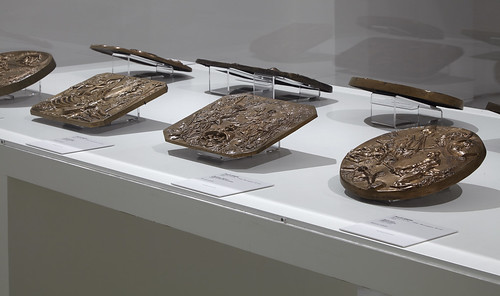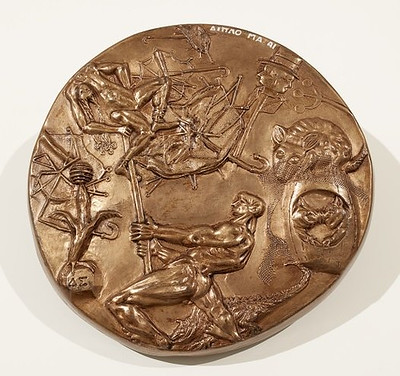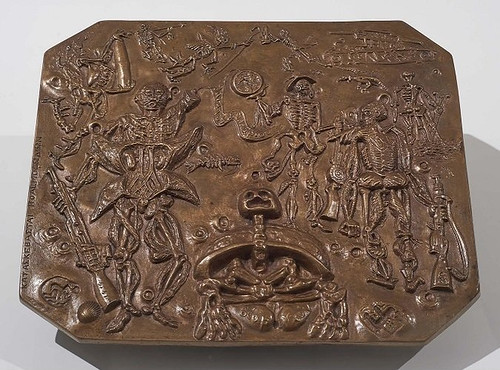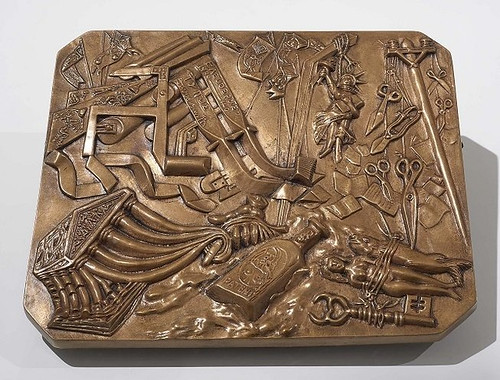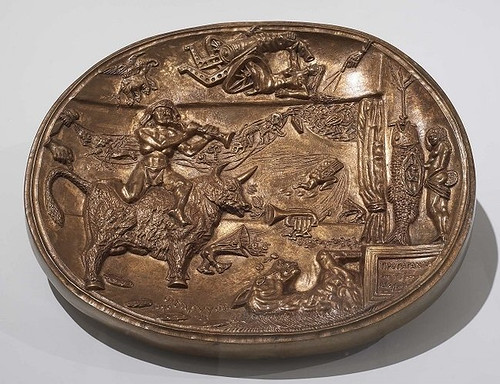
PREV ARTICLE
NEXT ARTICLE
FULL ISSUE
PREV FULL ISSUE
MORE ON MEDALS FOR DISHONORHere's more about David Smith and his Medals for Dishonor series from the Museo Reina Sofía in Madrid. -Editor David Smith (Decatur, Indiana, 1906-Bennington, Vermont, 1965) was one of the foremost artists of the 20th century. Smith, the sculptor most closely linked with Abstract Expressionism, revolutionized art in the United States by introducing into its sculptural idioms a rich synthesis of models pioneered in Europe by Pablo Picasso and Julio González, as well as the Surrealists, and the Russian Constructivists. Smith is believed to have created the first welded metal sculptures in America. His diverse and broadly inventive oeuvre paved the way for many of the sculptors who followed in the later twentieth century.
Between the autumn of 1935 and the summer of 1936, Smith travelled to Europe, where he enriched his artistic grounding and came face to face with the social and political tensions occurring across the old continent. He spent one month in Paris before a lengthy stay in Athens, where he was given the opportunity to explore classical art in depth. Smith also travelled to the Soviet capitals Leningrad and Moscow, where he contemplated some of the masterpieces of modern painting. Finally, while in London, he discovered the British Museum's collection of Sumerian seals with reverse carvings as well as its collection of German medals from the First World War, which were key to the formulation of the series Medals for Dishonor.
Medals for Dishonor is a series of fifteen reliefs produced between 1937 and 1940. Through them he executed a profound critique of a period marked by the far-reaching social and political consequences of the economic crisis and the onset of war. The series, exhibited at the Willard Gallery in New York in November 1940, was influenced by the sense of disappointment in humanity's regression through fascism in Europe and the injustices of world capitalism. Therefore, after the series was displayed in various US states, in December 1941 the artist told the gallerist Marian Willard that the medals reflected an
The entirety of Smith's artistic output is characterised by a particular engagement with the most artisanal side of the work. From the 1930s onwards he welded and soldered his own abstract pieces, combining the production of steel sculptures with the ambitious work Medals for Dishonor, on which he would work night and day. For these reliefs Smith employed the technique used by the Sumerian seals carved in reverse - the huge demands and attention to detail in the whole process, from the preparatory drawing to the finished plaster casts, for which he even used dentist's tools, explain the time it took him to finish the series. The rigorous technique was carried over into making up the first edition of the medals in metal, a process which saw Smith work with a local jeweller.
To read the complete article, see:
Wayne Homren, Editor The Numismatic Bibliomania Society is a non-profit organization promoting numismatic literature. See our web site at coinbooks.org. To submit items for publication in The E-Sylum, write to the Editor at this address: whomren@gmail.com To subscribe go to: https://my.binhost.com/lists/listinfo/esylum All Rights Reserved. NBS Home Page Contact the NBS webmaster 
|
